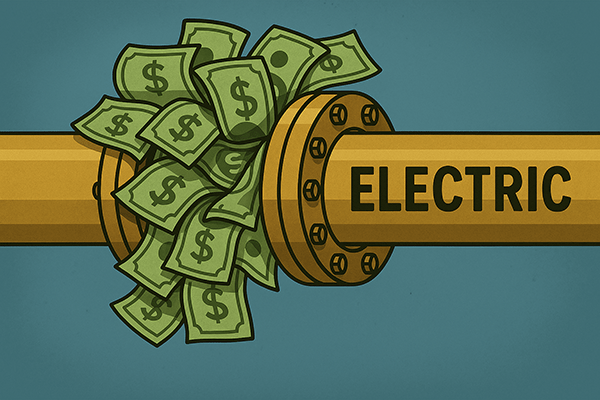|
RCBJ-Audible (Listen For Free)
|
County’s Threat Does Not Impact Agreements Signed By Towns, Villages, and School Districts
By Tina Traster
County Executive Ed Day is hoping a tactical ploy will bring the Champlain Hudson Power Express (CHPE) to the table to cough up more funds to assist businesses that have been negatively impacted by the pipeline project.
In a press release issued late Friday afternoon, he said the county will withhold the CHPE PILOT (Payment in Lieu of Taxes) agreement unless “funds are provided for businesses and residents.”
However, even if the county does withhold the PILOT – and CHPE is on the hook for more taxes over a 30-year period – the difference in monies does not guarantee that businesses or residents will see a penny to compensate for losses. Those with knowledge of the agreement say the county cannot legally use public funds to make residents or businesses whole.
All of the other taxing entities have already signed off on the PILOT and are legally bound by the agreement. They cannot rescind their agreements. The county is the only taxing entity that has not yet signed off on the PILOT agreement. If the county doesn’t sign the PILOT, an independent assessor will have to determine the value of multiple parcels to determine CHPE’s tax obligation to the county, and whether it will owe more or less than $14,129,612 over 30 years. Insiders agree that assessing the value of a pipeline that’s been built to run through the county but will only benefit New York City, will be difficult. The assessment may also yield years of litigation.
The assessment of multiple parcels would be a sizable and protracted task.
While the towns, villages and school districts have signed off on the PILOTs, the county has been sitting on the agreement for more than six months, according to insiders.
For months, local officials, including Senator Peter Harckam, Senator Bill Weber, and Stony Point Supervisor Jim Monaghan have been working to put pressure on CHPE to come up with additional funds to aid struggling businesses. Efforts to bring the plight to the attention of public officials have been led by the North Rockland Chamber of Commerce. Two weeks ago, Congressman Mike Lawler called a press conference to criticize New York State and Champlain Hudson Power Express (CHPE) for leaving businesses in the 9W corridor in a financial lurch. But he, along with town, county and state officials who’ve held previous press conferences to air concerns about CHPE’s devastating construction project, was unable ride to the rescue with federal dollars for more than 100 businesses who say they’ve lost $10 million in revenue since the CHPE roadwork disruption began.
In blustery language, Lawler told the crowd of business owners and public officials that the road blockages and 24/7 disruption to both businesses and residents is “unacceptable,” blaming the “state’s failure to plan and lead.”
While the county is issuing a public statement threatening to withhold a PILOT, it is most likely a tactic to get CHPE to pony up more than the $150,000 they have so far offered.
But CHPE has stood firm.
“It was understood years in advance that construction would be temporarily disruptive to the businesses and residents in Rockland County, which is why in 2018 CHPE and local leaders negotiated a $31 million community benefit plan that includes $9 million in streetscape improvements for Stony Point in the business district along the 9W corridor,” said a CHPE spokesman, after Lawler’s press conference. “CHPE has also provided over $500,000 in funding to not for profits and small businesses in Rockland County, including Stony Point, will pay almost $300 million in taxes to those same communities once the project is operational, and has already committed $150,000 for a North Rockland Chamber of Commerce small business fund.”
The county, three towns, two villages, and three school districts, negotiated a 30-year schedule of PILOT payments, but the county never signed the agreement. The county’s portion of the 30-year PILOT represents less than 10 percent of the total.
Stony Point will receive $18.8 million, Haverstraw, $31.6 million, and Clarkstown will receive $13.3 million over 30 years. None of the town, village or school district PILOTs can be rescinded. The county lacks the authority to rescind those agreements. Payments are slated to begin next year.
PILOTs schedule payments to taxing jurisdictions over a long term. They provide certainty of revenue for the county, town, village, and school district, though the amounts are typically lower than assessments based on fair market value.
“This project has caused real and measurable harm to our community,” said Day, in the press release. “Small businesses are losing customers, residents are facing constant disruptions, cars and properties are sustaining damage by the work, and our first responders are facing delays that could literally cost lives. That is unacceptable.”
The CHPE project is winding up within the next couple of weeks; the James Farley Bridge is slated to open within the week. CHPE’s crews are expected to return in spring to complete the paving and restoration on Route 9W.
CHPE’s transmission line is slated to deliver 1,250 megawatts of renewable energy to New York City. The service area does not include Rockland County.
CHPE when it becomes operational next year will deliver 20% of New York City’s energy, all of it clean, making up much of the clean energy lost with the closing of Indian Point, said a spokesperson from CHPE.















